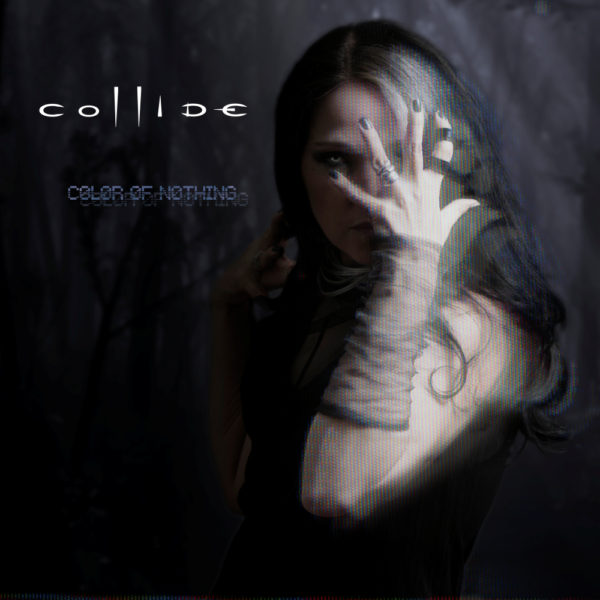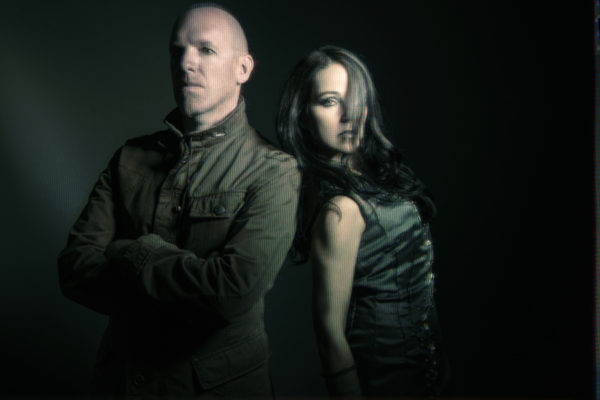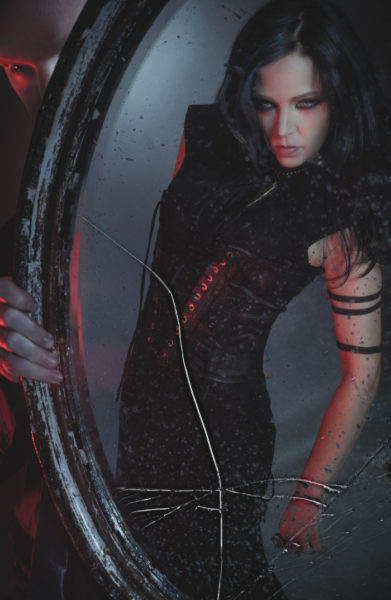
Streaming services, such as Pandora and Spotify have made life difficult for all but the biggest acts in the music industry. The CD-buying public has become the song-streaming public, with artists making a quarter of a penny or less per streamed song. But streaming services do provide one advantage over the days when artists needed airplay to get discovered: on them, all artists are equal. In fact, that is how I discovered Collide. They kept popping up in my Garbage station on Pandora.
Even though I’m now known as a college speaker and an author of nature-travel books, my background includes many years working in both radio and talent management. So when I hear something special, I know it—both as a music fan and as a professional. With Collide, it was love at first listen. Their vocals are ethereal but with depth; their instrumentation is up-tempo and catchy but with a minimum of obvious hooks. Categorizing their music is difficult, but similar artists include Garbage, Kate Bush, Curve, Kidneythieves, Ego Likeness, and Sneaker Pimps.
After hearing several songs on Pandora, I was eager to learn more about Collide, so I checked out both their Wikipedia page and their Facebook fan page (which currently has 18,825 followers). I had assumed they were new and was shocked to discover that they had been putting out music for twenty years. Over that time, they had released nine albums, a concert DVD, and a side project, called The Secret Meeting (with Dean Garcia of the band Curve). I purchased their entire catalog and found each disc to meet the same meticulous, high-quality standard. Later I learned that the band was far from done, as they will be releasing a new album, Color of Nothing, on May 25, 2017.
Collide is vocalist and lyricist kaRIN and music crafter and producer Statik. In the rare instances they perform live, they add a full complement of accomplished musicians. How does a talented and exotic-looking band achieve such prolific longevity, while maintaining relative obscurity? To find out, I spent a delightful afternoon with the Los Angeles-based couple, talking about the art that happens when different personalities and musical styles Collide.
Marty: Let’s start out with some history on the group. How did Collide start?
kaRIN: Well, in 1992, I was at a club and Statik just happened to be the next person standing in line. I wanted some water and asked him if he would get me some when he got his drink. We talked for a bit and became friends. Statik had his own project, called “Statik,” that he was working on in a studio. He asked me to come and sing on a song. And I did—and we never stopped.
Marty: Did you have any previous professional singing experience?
kaRIN: No. In my youth, my friends all played acoustic guitar. We would sit around at parties and sing all the songs we could think of. Somewhere in there I found that singing was a really good escape for me—something I totally got hooked into.
Marty: How did you get into music, Statik?
Statik: I was always into music. In school bands, I started with the trumpet and eventually became a drum major. When I got into college, I switched to business, but that was too boring. Later I went to a music school, in California, where I took their engineering program. From there, I got my first studio job, worked on my own music projects, and eventually met kaRIN.
Marty: What instruments do you play?
Statik: I don’t know that I’m proficient at any, other than computer programming. I have a good ear, so I’m good at playing what I need to play—and manipulating the rest. For the most part, I do all the music, and kaRIN does all the vocals. Then we’ll have other people come in for certain parts as necessary.
Marty: In what year did Collide start?
Statik: Our first record came out in 1996.
Marty: Are you two married?
Statik: We aren’t officially married.
kaRIN: But we like each other a lot! I’m not a very traditional person.
Marty: Do you have an in-home studio?
kaRIN: We actually have two. Statik has a studio, where he does his thing, and I have my own vocal studio, where I do my thing. For the most part, we work individually.
Marty: Statik, you’ve worked with Prince and some other big names. What can you tell me about that?
Statik: In the early nineties, I was assisting a mixer named Keith Cohen, who was mixing most of Prince’s projects. Besides working as a mixing assistant, I would do various drum and keyboard programming to the songs. After about a year, Prince asked me to move to Minneapolis and work just for him. So I ended up living in Minneapolis for two years.
Marty: Who else have you worked with?
Statik: I worked with Michael Jackson for a while. It’s kind of a funny story, because the same guy I met Prince through was working with Michael Jackson, and I ended up filling in for his assistant—who was out of town. I came in and did programming for Michael on one song, and he liked it so much that he asked me to work with him on an ongoing basis. His big thing was that he wanted me to create sounds that he had never heard before. Mostly what I did for both Prince and Michael Jackson was creating what I call “grooves.”
kaRIN: He’s also worked with Tool and Skinny Puppy.
Statik: Among others—doing programming and editing for other people was really my gig for a long time.
Marty: Some have called your music “industrial-ethereal.” How would you describe it?
Statik: That’s not a bad description. The ethereal side definitely comes from kaRIN. She’s not a rock singer or a screamer.

kaRIN: I’m moody. (She laughs.)
Statik: That’s what I like about her voice. I’ve always thought of it as a little bit Kate Bush. And musically, I’ve always been a fan of industrial, alternative, and electronic music.
kaRIN: I’d call our music melodic with an edge. It has a lot of sound layers.
Marty: Who are your biggest influences?
kaRIN: Kate Bush, David Bowie, and Pink Floyd. Those three hit me at my most formative time. Their lyrics and music are timeless.
Statik: Skinny Puppy, Gary Numan, and Queen for sure—I was always a big fan of their huge vocal arrangements.
Marty: How many total albums have you sold?
Statik: That’s tough to answer. At one point, we were distributed through a small label that was distributed through Warner Brothers. Even though we sold well, others on the label didn’t, and we didn’t get paid.
kaRIN: We also had distribution through another company, and they went out of business. Then we decided that rather than deal with other labels, we might as well do it ourselves.
Statik: And unfortunately, the music streaming services haven’t made life any easier for musicians. We get compensated, but not much. But that’s the way people choose to get their music these days.
kaRIN: Music streaming services are great for exposure. On the other hand, it’s so easy now to not buy music. I have friends who have suggested streaming a specific album and then letting it play all night to let the musicians make more money. (She laughs.)
Statik: It’s one of the reasons more bands are doing things like PledgeMusic or Kickstarter before an album comes out. We have all that in place as well.
Marty: How can you be based in Los Angeles without having major labels after you?
Statik: What labels want is not us. They want to sign some young pop star.
Marty: You don’t exactly look old. In fact, kaRIN, if you look at your photos on album covers through the years, you haven’t changed a bit.
kaRIN: I’m a vampire! When we first started, we sent demos to a bunch of labels and got a bunch of rejects. Then we started doing things ourselves and decided we liked having all of the control. And when things in the music industry started falling apart, having a label didn’t make it any better. We didn’t want to have a label telling us we couldn’t record something because it wasn’t a hit. At the core of it, we want to make music we want to hear.
Statik: We’re not about crafting a hit song.
Marty: I saw your concert DVD, filmed at the El Ray Theatre in Los Angeles. It looked like you packed the place.
kaRIN: The was our ninth and last show to-date.
Marty: You couldn’t tell by watching that you had performed so few shows. The concert was outstanding and your side musicians were excellent.
kaRIN: For Statik and me, it was a lot of sound coming out of two people. Originally, we didn’t think about playing live, but after releasing all these albums, we decided to do a live show with real live players. And it took a while to sort it all out. How to do our music live—and surround ourselves with really talented players—but we did, and we booked a West Coast tour. Then others said they could book us, but no one did. We once got a call from someone hoping to book us in New York City who said, “No one knows you here. Do you have any scandals?”
Marty: Do you work day jobs to support your music?
kaRIN: I do. I have my own accessory company, where I design jewelry and leather items. I sell them to stores and galleries across the country. I’ve been doing that longer than music. All of my working life I’ve run my own business and have been a creative person. I’m just grateful that somebody pays me.
Statik: And I still do music for other people.
Marty: Is there any artist that makes you turn off the radio?
Statik: That would be if we listened to the radio.
kaRIN: For me, being a vocally oriented person, if I don’t like what you’re saying, or if I think it’s just “telling me what I want to hear music,” then I shut down on it. That’s why I’ve always gravitated toward moody music that is actually saying things.
Statik: Today’s music on the radio is a little sad.
kaRIN: On the other hand, I like the exposure of listing to what’s new—but via something like Pandora or Spotify, not radio.
Marty: What process do you go through to create an album?
kaRIN: It takes us a really long time. Typically, Statik will put some sounds together, and do a rough.
Statik: I like to make a song that’s not 100% complete—leaving room to go different places.
kaRIN: And then I will take it into my studio and mess around with it. I might write five to seven different songs—until I get something that is connected with the music—and I like enough to play for Statik. And then, if I’m really lucky, he might say something like, “I don’t hate it.” (She laughs.)
Marty: Being that you have both a personal and a musical relationship, how do you deal with egos?
Statik: A long time ago, we agreed that we needed to be open to criticism. I have to be able to put on my producer hat.
kaRIN: Here’s the interesting thing: I might be pouring my heart out in a song, but he doesn’t listen to lyrics. So if it doesn’t hit him on a note level, he’ll say, “Okay. This just isn’t working.” We’re so different. Which is why the name “Collide” is so fitting for us. I’m into lyrics, and he doesn’t care—as long as the melody and notes are good.
Statik: I can listen to a song fifty times in a row and not know the lyrics.
Marty: It’s a guy thing.
kaRIN: I can listen to a song once, and if I feel the words are cheesy—I’m out. At the end of the day, I want to make art. I want to make something that is elevated, and as good as we can possibly make it. So if a song doesn’t work, I will go back to the drawing board and keep at it. And that happens a lot. I don’t think writing music has gotten any easier for us. Once we get to the “he doesn’t hate it” level, then we will work it out further in the studio.
Statik: Once I have vocals to work off of, it makes all the difference. Then it turns into a song.
kaRIN: And then he’ll get back in the studio, shape off of what I’ve done, and flesh it out. When I finally join him in his studio, I will improvise by adding what I feel at the time. Often those off-the cuff vocals make their way into the final version of the song.
Marty: How’s the new album coming along?
Statik: It’s close to being done. We started working on it a couple years ago, and really started working harder on it at the end of 2015. We have to finish the vocals on two songs, and then it’s just mixing.
Marty: What else can you tell me about it?
Statik: One good thing about this album is that we’ve had more time to live with it than our other albums. It’s allowed us to only keep the songs we really love.
kaRIN: Our high standards drive us. If we can both be satisfied with it—then it’s good. We are always trying to add that extra 10 percent to make it better. If you break our music down, it’s all the little details. There is a lot going on.
Statik: That’s my favorite part. After the song is almost done, adding all of the embellishments.
kaRIN: I’m definitely a humanist, and with all the current craziness that is going on, it could not help but come through in our new album. I realize that people will say you should just make music and not be political. And I’m like, then it would be called “elevator music.” I get floored when musicians get attacked for having an opinion. But that’s exactly the point of art—to have an opinion.
Marty: Do you see an end to Collide, or is this a project you see going on indefinitely?
kaRIN: I think we’re both driven to make music. That’s the thing when you are an artist—it’s just part of what you do. I don’t see us ever stopping putting out music. I just see us doing it on our own terms.
Marty: What is the key to your longevity?
kaRIN: You have to keep things interesting and get along with each other.
- About the author: Marty Essen is a college speaker and the ten-time award-winning author of two environmentally themed books, Cool Creatures, Hot Planet: Exploring the Seven Continents and Endangered Edens. His third book, Time is Irreverent, a time travel political-comedy novel, is in the works. His website is MartyEssen.com
It’s a very cool interview, thanks!
Thank you so much. Been burdened with “perfectionism” myself. Very inspirational interview. We’re all just trying to commune with the divine energies that assist us in our Never ending story. Karin, Statik. Thank you for being a maskless and vulnerable source of light and love all these years. MUCH Love to two twin flames doing the work. ?